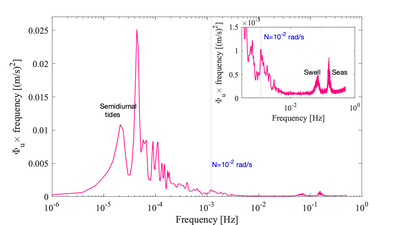Time and length scales of turbulence: Difference between revisions
mNo edit summary |
|||
| Line 17: | Line 17: | ||
=== Low wavenumber limit === | === Low wavenumber limit === | ||
Of the order of the largest | Of the order of the largest overturn sizes... | ||
* Stratified waters Lo | * Stratified waters Lo | ||
* Near a boundary <math>L_Z=0.39z_w</math> via von karman's constant of 0.39 and zw the distance to said boundary. | * Near a boundary <math>L_Z=0.39z_w</math> via von karman's constant of 0.39 and zw the distance to said boundary. | ||
Latest revision as of 13:21, 7 July 2022
The length and time scales of turbulence must be considered when analysing turbulence measurements. The scales at which the turbulence subranges, both the viscous and inertial subrange, exist depend on the flow properties. These characteristics of the flow influence various decisions when processing velocity measurements for turbulence computations such as:
Lengthscales

Add links to correct pages
High wavenumber limit
For instance, the wavenumber (length scale) limits depend on the sought quantity [math]\displaystyle{ \varepsilon }[/math], and also the kinematic viscosity [math]\displaystyle{ \nu }[/math]:
[math]\displaystyle{ L_K=\left(\frac{\nu^3}{\varepsilon}\right)^{1/4} }[/math]
Low wavenumber limit
Of the order of the largest overturn sizes...
- Stratified waters Lo
- Near a boundary [math]\displaystyle{ L_Z=0.39z_w }[/math] via von karman's constant of 0.39 and zw the distance to said boundary.
- Sheared flows can also swap Lo with Ls (Corrsin). Ls = Lz in a pure log-law of the wall flow!
Timescales
Can use the equation [math]\displaystyle{ \tau=(L^2/\varepsilon)^{1/3} }[/math] and dump your favourite turbulent length scale. In stratified waters, this amounts to 1/N.
